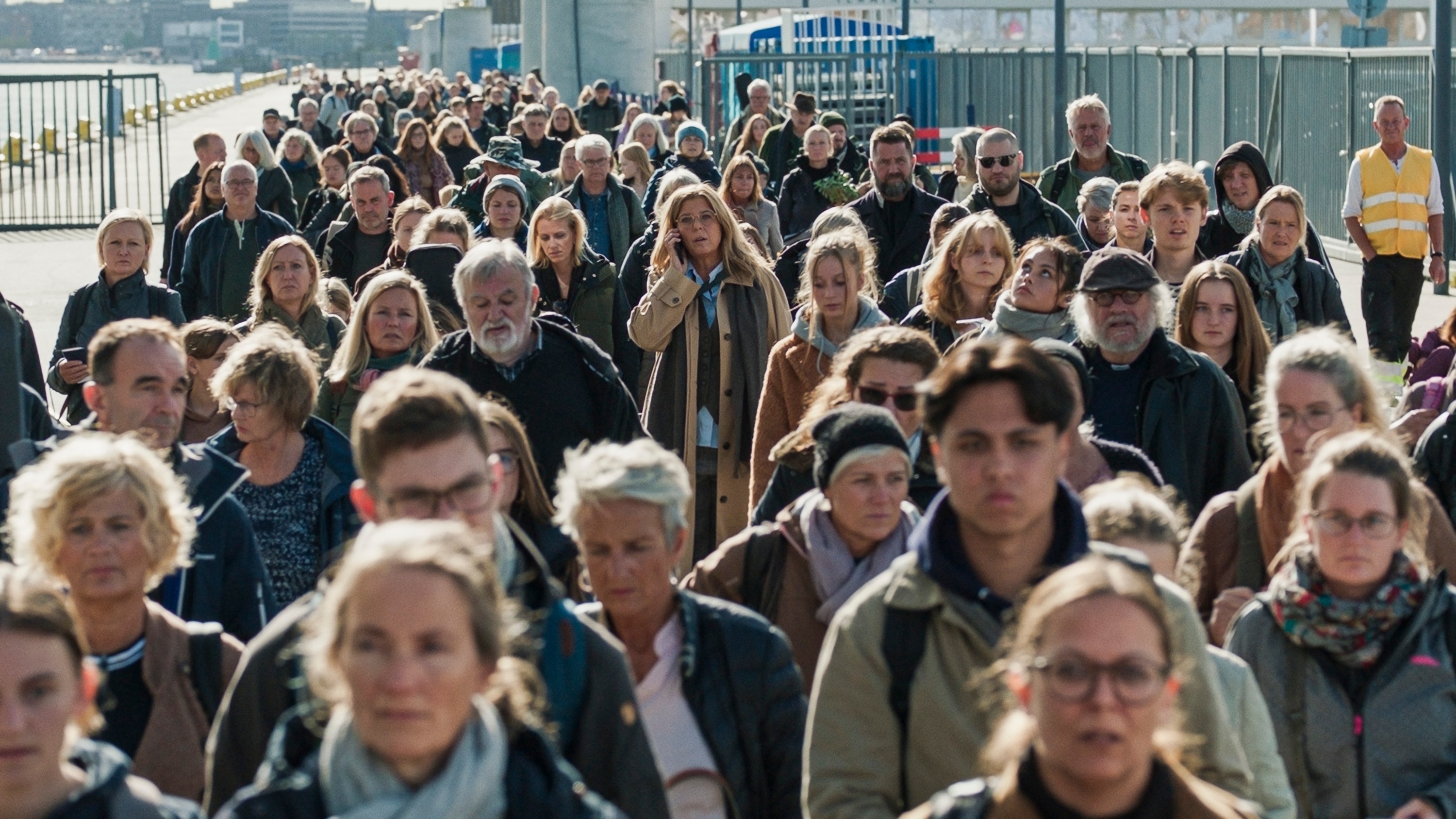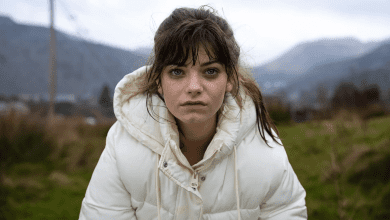Thomas Vinterberg on Avoiding “Disaster Film Cliches” in Climate Change Miniseries ‘Families Like Ours’

When the Syrian War broke out in 2011, triggering a wave of refugees to Europe, Thomas Vinterberg felt a surge of empathy towards the millions of families forced to flee their homes and seek shelter in foreign lands. But when the Oscar-winning director of Another Round, The Hunt, and The Celebration saw the response of many Europeans — often hostile, sometimes violent — he began thinking: What would happen if a disaster hit closer to home and “we were the refugees”?
More than a decade later, that “thought experiment” led to Families Like Ours. The miniseries, which premieres at the Venice Film Festival before heading to TIFF, imagines a near future where rising sea levels force the government of Denmark to evacuate. The entire country. Turning its six million inhabitants into refugees, forced to seek shelter in whichever countries will have them.
The series features a who’s who of Danish talent in its ensemble cast, including Nikolaj Lie Kaas, Thomas Bo Larsen, David Dencik, Paprika Steen and Magnus Millang. StudioCanal and Zentropa produced the six-part series, which will go out on Denmark’s TV2 in October. StudioCanal is selling worldwide.
Speaking to The Hollywood Reporter, Vinterberg explained why he avoided “disaster film cliches” to focus on the human drama of climate change and mass migration, creating “a dystopia in slow motion” and how a rude French waiter inspired the show.
This is a dystopian story, a bit science fiction even, but it seems to be a very personal one as well. Where did the initial idea for Families Like Ours come from?
This idea came up at least six years back, which was pre-covid and pre-Ukraine war. It came from seeing how we treated people from Syria coming to Copenhagen. And I wanted to make a thought experiment testing human beings from Western society, thinking what would happen if we were the refugees, if we would have to say goodbye to everything we love? How much resilience could we muster? How many coping strategies can we come up with? It’s like: Who do you put in your lifeboat if you only have four seats? It’s the psychological questions that bother me most, those are the spine of this series, which is why I didn’t want to show any flooding and natural catastrophe scenes.
But the real spark to write this show came when I was in Paris for work. I’d been living there for a year, a year and a half, and I felt super unwelcome. I’d go to the same cafe every day and they still treated me incredibly rude, like a tourist. One Sunday, I just wanted to go home to my family, I was missing my daughters, and I became occupied with what it would be like if we were forced to be separated, like in the film Brooklyn, about the huge immigration from Europe to the United States [in the 1950s]. And thinking about my daughters, I was inspired by their concern for the state of the planet and climate change.
As you say, there are no scenes of natural catastrophe here. There’s no disaster porn. But did you do any research into the science of climate change or into the other elements of the story?
We did a lot of research, not into climate change but research of a different kind. We did research into the state of Denmark. If this sort of disaster happened here, what would our Foreign Ministry do? Of course, you can’t do research about the future because it hasn’t happened, but we spoke to a lot of people, to try to imagine, how would this country, this little Shire that I come from, react? And we decided we would react early, ahead of the water flooding the country. We would try and care for all our citizens instead of spending a lot of money trying to save parts of the country, we would try to rescue as many as possible in the best possible way. I also talked to people who know about climate change and we talked about dams and drainage systems, where the water would come from and how the state would get rid of it. But it’s still all guessing, even if its experts guessing. They know something is going to happen, but exactly what, exactly what form it will take, even the experts are still guessing.
Families Like Ours Sturla_Brandth_Gr__vlen____Zentropa_Entertainments__StudioCanal__CANAL__TV_2_
This is a story about families, which gives it a universality. But it is also specifically Danish and I wonder if, politically, Denmark is an interesting country to look at with this story of mass migration. Because Denmark was one of the first countries in Europe to really begin to crack down on migration and immigration, almost setting the pattern for the rest of Europe.
First, I want to say my series here is primarily about human beings, with these singular persons, who all react differently. Like Rilke says: “there’s no unanimous way of reacting as a human being.” There are millions of ways of reacting. I’m concerned with the bravery of refugees and things like that. But your question is particularly painful to me, it really puts a finger in a wound. Because when I grew up in Denmark, we had a very different reputation. When I received my first awards back with The Celebration, one was in Los Angeles to receive a Jewish award for the help Denmark gave to Jewish refugees [in World War II]. Denmark sneaked people out [of the German-occupied country] to safety in Sweden. That was our society. And then, in 2016, our government destroyed that story and became a country that I wasn’t proud of anymore. We created a law where we could confiscate refugees’ jewelry at the border. I thought that was so far from humane, I couldn’t believe it. I said publicly I was embarrassed by my country, I got into a public fight with a Danish journalist because of this. It was a very painful time. There’s an echo of this in Families Like Ours. I think our country has moved on from that dark period and hopefully, our identity will recover at some point. But there’s definitely an echo of that in my story, in trying to reverse this situation and say: “Okay, what if we are the refugees?” There’s an element of satisfaction to that as well.
Across Europe, there’s this idea of a fortress of Europe. The political forces in almost every country seem to want to build walls to keep people out. This idea of a unified, borderless Europe, which still in some ways exists, is now being very strictly defined according to who you are and where you come from.
But if we talk about fortresses, this is more than just a local, a European or a Danish phenomenon. It’s more universal than that. Look at the fortress of America, where they’re building a wall, not tearing any down. It’s the agenda around the world. That’s why I find it interesting to reverse things and put the Westerners in the refugee position.
As you said, you avoided cliched disaster images. What then was the most challenging thing for you in shooting this?
Well, it’s a challenge now to position this series in a way that people understand that it is a human drama. It might be a disaster series, but it’s a disaster in slow motion. And the show takes place in seven different countries that were unknown to me. So we did a lot of research to make everything plausible. That was a huge challenge. We did a lot of test screenings with audiences, and they kept asking questions like: “Why are they moving out of the country when there’s no water in the streets?” that sort of thing. So we had to find ways to inform the audience that this is how it would be in a well-functioning, Western country like Denmark. We would know ahead of time that the water is coming and we wouldn’t wait for the flooding to move out. We don’t believe that’s how it would work. We found that unrealistic. But having this agreement with the audience through months and months of research to find out how to explain this was very difficult.
Did the research extend to how different countries would react to a flood of Danish refugees?
Yes, but you can never say exactly how a country reacts, because the only general thing you can say about human beings is when there’s a crisis, when you feel threatened, there’s a regression. You pull back, you find your closest people, you start protecting yourself. That creates aggression. You can see that Poland was very friendly and generous and welcoming to Ukrainian refugees. But if Poland was flooded by foreigners, as it is in our future world, that would create a crisis and a regression and aggression. [But] there is also a lot of generosity to be found in this series. The core of the series is a girl who sacrifices her own life, her own career and everything, to help her mom. And then there is Elias [played by Albert Rudbeck Lindhardt] who crosses a continent to be with a girl that abandoned him.
Did you come out of making this series more or less hopeful about the future?
Well, it’s a bit like the question why do we keep flying? Why do I keep flying and buying new clothes and all that stuff that destroys our planet, knowing that it destroys our planet? But I guess it’s because it’s the best we can do. This [climate change] is something we can’t cope with, its just too big a catastrophe. So we return to focus on our own little self and world. I find that really interesting. And there’s a forgiven element in that, because this is the best we can do. It’s not that we don’t care, but this is just the best we can do.
Have you gone back to that cafe in France and thanked the rude waiter for inspiring you?
I haven’t, and he would go, he’d probably just say: ‘Who the fuck are you?’ and insult me. In French.
Check out the trailer for Families Like Ours below.
Source: Hollywoodreporter
Related Posts
- Roundball Rocked: With NBA Return Looming, NBC Purges Scripted Roster
- SoundCloud Says It “Has Never Used Artist Content to Train AI Models” After Backlash on Terms of Service Change
- Fox News’ Camryn Kinsey Is “Doing Well” After Fainting on Live TV
- Kerry Washington and Jahleel Kamera in 'Shadow Force.'
Courtesy of Lionsgate
…
- This Alternative Artist Landed a Top-20 Chart Debut With an Album Made Almost Entirely on His Phone





